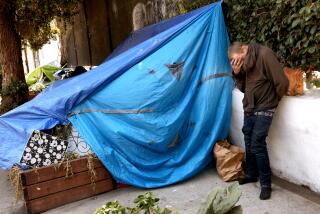Attempt to Nullify Election Defeated
- Share via
The city of Vernon’s attempt to stop candidates from forcing the town’s first contested election in 25 years was shot down Thursday by a judge who described the city as one “run like a fiefdom.”
The decision marks a defeat for officials of the small city south of downtown Los Angeles, which has spent months trying to invalidate the April election. City officials have refused to count the ballots from the vote until this and several other lawsuits are settled.
Vernon leaders have insisted that the candidates were ringers brought in by opponents trying to take control of the cash-rich industrial town. The challengers deny the claim and say leaders who have controlled the town for decades went to great lengths to prevent them from running for office.
It was up to Los Angeles Superior Court Judge Aurelio Munoz to sort out the charges and countercharges, and neither side emerged unscathed.
Munoz said attorneys representing the city did not present the evidence of fraud necessary to strip the eight men and women of their right to vote or run for office.
Still, Munoz said he thought there was a “scheme” to take political power in the industrial city of only 91 residents, most of whom are city employees living in heavily subsidized city housing. But the judge said moving into a city with the intent of taking over political power is not necessarily illegal.
“It’s not illegal to try to steal an election,” Munoz said, shrugging. “Just pooling [people], registering and voting -- that’s not enough to cancel an election.”
The decision left attorneys representing Vernon City Clerk Bruce Malkenhorst Jr., the municipality’s top election official, disappointed as they filed tight-lipped out of the courtroom. When asked for comment, they refused to speak. With a nod, lawyer Frank Revere indicated there would be an appeal.
Malkenhorst began efforts to cancel the challengers’ registration soon after they moved into a small building in the middle of a field of asphalt and abandoned rail tracks in early January.
Within days, three of the new residents -- Don Huff, David Johnson and Alejandro Lopez -- had gone to City Hall and registered to run for office. Shortly afterward, power to the building was cut off by the city, they were served with eviction notices and their locks were drilled out as they were evicted.
The city paid for private investigators to tail the men and women who had unexpectedly moved into Vernon. On at least two occasions, police arrested investigators who allegedly pulled guns on people after car-to-car surveillance.
Malkenhorst canceled their voter registration and the City Council voted to cancel the election and reelect three of its members. Another judge subsequently ruled that the city clerk’s actions were illegal.
On April 11, the city held its first election in a quarter of a century, but Malkenhorst decided not to count the votes pending the resolution of litigation. The ballots are reportedly being sequestered at Vernon City Hall.
The ballots will not be counted, at least for now, pending two other lawsuits that Munoz could hear soon.
“I feel like justice was done,” said Huff, 41, a paper company employee who said he persuaded Johnson and Lopez to run for office with him. “I know I can win, man, I know I can win,” he said. “I just want to go to my home in Vernon.”
Huff said he has been living out of his 2002 Trailblazer on 52nd Street in Vernon.
“I’m not discouraged at all. In fact, I want another reelection,” Huff said. “After all the stuff they put us through -- loss of wages, living like a hobo -- I’m not giving up.”
Vernon has not had a contested election since 1980, when city officials evicted a candidate for office after he filed his nomination papers. In that case, former Vernon Police Chief Spence Hogan won the vote count but lost the election after Malkenhorst’s father -- former city administrator Bruce V. Malkenhorst -- disqualified a number of ballots.
In the latest election controversy, the younger Malkenhorst and city officials based their case for stripping voter registrations and canceling the election on their allegation that certain people -- including former South Gate treasurer and convicted felon Albert T. Robles -- were behind everything.
The city also pointed a finger at Eduardo Olivo, a former Vernon city attorney who was fired in 2004 after accusing the elder Malkenhorst of defrauding the city.
Olivo’s involvement is especially sensitive for Vernon officials because a report he compiled as city attorney became the basis of an ongoing probe by the Los Angeles County district attorney’s office into allegations of public corruption in Vernon.
Olivo, who acted as a lead plaintiffs attorney during the trial, criticized what he said was a lack of evidence by the younger Malkenhorst and the city. During two days on the stand, Malkenhorst Jr. testified that a “daisy chain” of connections, all leading to Robles, caused him to suspect fraud.
Robles was present at the Vernon property in question and handed $100 to one of the former tenants when they moved out, presumably for “beer money,” according to court testimony. Also, Robles was seen at the home of Cristeta Summers, a disbarred lawyer who was helping the challengers and who had worked closely with Robles in South Gate, according to testimony.
Olivo said it was no secret that Summers and Robles were close friends, and he dismissed Robles as a “despicable character” who had a reputation for being “bombastic and rude.”
“I’m sure when all is said and done, Albert T. Robles is not going to be running a city from behind bars,” Olivo said.
In closing arguments Thursday, Paul Gough, an attorney representing the younger Malkenhorst and who also has represented the city, tried again to argue that those who moved to Vernon were not legally domiciled there. The judge cut him off.
“They were living there. They were domiciled,” Munoz said. “The city kicked them out.”
Judy Whitehurst, a senior deputy counsel representing the Los Angeles County registrar’s office, said the registrar determined that the people who moved into Vernon were domiciled in that city.
She added that there was no proof of voter fraud, but that if Vernon officials had such evidence, they should have gone to county prosecutors.
“The L.A. County registrar does take voter fraud very seriously,” Whitehurst said. “It seems to me that a requirement of canceling a registration is a felony conviction. And voter fraud is a crime, and it’s a felony.”
Whitehurst also took issue with testimony that at times centered on the financial stability of some of those who moved into Vernon and the way they looked.
At various times, Munoz repeated that he thought there were “too many coincidences” to believe that people just moved into Vernon for “cheap rent” and decided to run for office only as an afterthought.
“I think this was all a scheme hatched out by Eduardo Olivo, Cris Summers and Albert Robles,” Munoz said. “Basically, they saw a chance to take over this city.”
But in the end, Munoz said, he could not be swayed that anything illegal happened.
Olivo said the candidates’ dogged pursuit of office, especially after the surveillance and the eviction, was not evidence of a well-oiled takeover plot. It was, in part, just evidence that once pushed, they became ever more determined to push back.
“Private investigators were following them and pointing guns in their face because they were running for office in the city of Vernon,” Olivo said. “This is not normal.”
More to Read
Sign up for Essential California
The most important California stories and recommendations in your inbox every morning.
You may occasionally receive promotional content from the Los Angeles Times.











